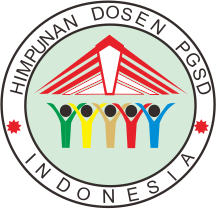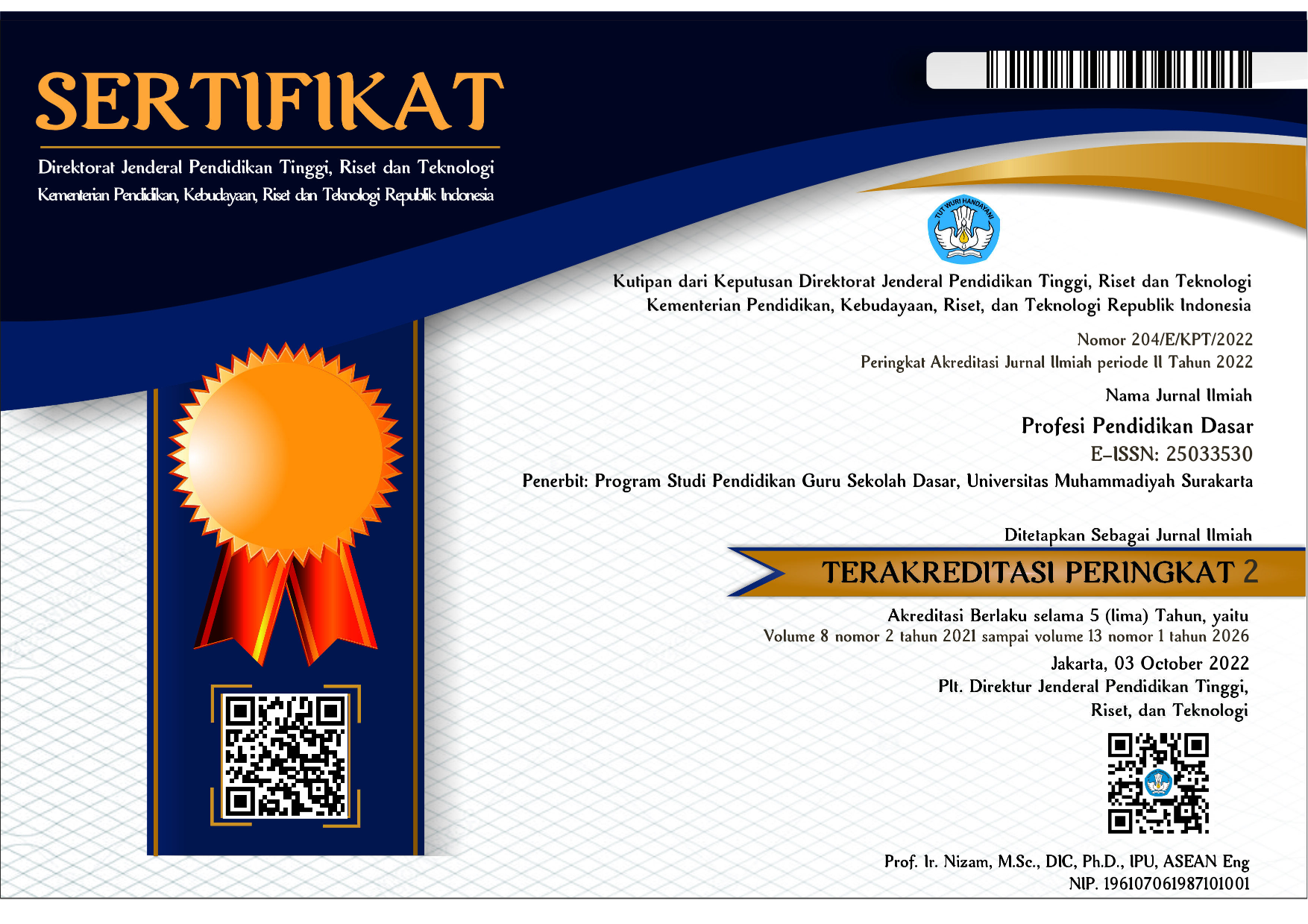VIRTUAL MATHEMATICS KITS (VMK): MEMPROMOSIKAN MEDIA DIGITAL DALAM LITERASI MATEMATIKA
Octarina Hidayatus Sholikhah(1), Lingga Nico Pradana(2*)(1) PGSD FKIP Universitas PGRI Madiun
(2) UNIVERSITAS PGRI MADIUN
(*) Corresponding Author
Abstract
The digital era makes education begin to be contaminated with technology. This study aim to determine the effectiveness of Virtual Mathematics Kits (VMK) viewing by student' mathematical literacy. The VMK was used in extracurricular activities based on mathematical literacy. 83 elementary school students (grade 5) in 4 school participated in this study. There were two intervention classes and two non-intervention classes. All classes were given mathematical literacy activities for 6-weeks period (90-min each week). The VMK used in intervention classes. The activities focus on student' ability to make ideas, reasoning and solve various mathematical problem. The mathematical literacy activities led to improvements in both of two classes. However, the use of VMK make student' mathematical literacy much better. The VMK support student to reason and manipulated mathematical object although students have difficulty to operate VMK. This study showing the use of digital media (VMK) support student' mathematical literacy.
Keywords
Full Text:
PDFReferences
Akayuure, P., Asiedu-Addo, K. S., & Alebna, V. (2016). Investigating the Effect of Origami Instruction on Preservice Teachers’ Spatial Ability and Geometric Knowledge for Teaching. International Journal of Education in Mathematics, Science and Technology, 4(3), 198–209. https://doi.org/10.18404/ijemst.78424
Ehmke, T., Wild, E., & Müller-Kalhoff, T. (2005). Comparing adult mathematical literacy with PISA students: Results of a pilot study. ZDM - International Journal on Mathematics Education, 37(3), 159–167. https://doi.org/10.1007/s11858-005-0005-5
Field, A. (2013). Discovering statistics using IBM SPSS statistics (4th ed.). London: Sage.
Firdaus, F. M., & Herman, T. (2017). Improving primary students ’ mathematical literacy through problem based learning and direct instruction. Educational Research and Reviews, 12(4), 212–219. https://doi.org/10.5897/ERR2016.3072
Gatabi, A. R., Stacey, K., & Gooya, Z. (2012). Investigating grade nine textbook problems for characteristics related to mathematical literacy. Mathematics Education Research Journal, 24(4), 403–421. https://doi.org/10.1007/s13394-012-0052-5
Genlott, A. A., & Grönlund, Å. (2016). Closing the gaps - Improving literacy and mathematics by ict-enhanced collaboration. Computers and Education, 99, 68–80. https://doi.org/10.1016/j.compedu.2016.04.004
Güven, B., & Kosa, T. (2008). The effect of dynamic geometry software on student mathematics teachers’ spatial visualization skills. Turkish Online Journal of Educational Technology, 7(4), 100–107.
Haara, F., Bolstad, O., & Jenssen, E. (2017). Research on mathematical literacy in schools - Aim , approach and attention. European Journal of Science and Mathematics Education and Mathematics Education, 5(3), 285–313.
Hofer, T., & Beckmann, A. (2009). Supporting mathematical literacy : examples from a cross-curricular project. ZDM Mathematics Education, 41, 223–230. https://doi.org/10.1007/s11858-008-0117-9
Ic, U., & Tutak, T. (2017). Correlation between Computer and Mathematical Literacy Levels of 6th Grade Students. European Journal of Educational Research, 7(1), 63–70. https://doi.org/10.12973/eu-jer.7.1.63
Julie, C. (2007). Learners ’ context preferences and mathematical literacy. Mathematical Modelling (ICTMA 12): Education, Engineering and Economics. Woodhead Publishing Limited. https://doi.org/10.1533/9780857099419.4.195
Lange, J. de. (2003). Mathematics for Literacy. In Quantitative Literacy: Why Numeracy Matters for Schools and Colleges (pp. 75–90). https://doi.org/10.1007/b97511
Lengnink, K. (2005). Reflecting mathematics: An approach to achieve mathematical literacy. ZDM - International Journal on Mathematics Education, 37(3), 246–249. https://doi.org/10.1007/s11858-005-0016-2
Maxwell, S. E., & Delaney, H. D. (2018). Designing Experiments and Analyzing Data: A Model Comparison Perspective, Second Edition. New York: Routledge.
Mumcu, H. Y. (2016). Using Mathematics , Mathematical Applications , Mathematical Modelling , and Mathematical Literacy : A Theoretical Study. Journal of Education and Practice, 7(36), 80–96.
OECD. (2012). PISA 2012 Assessment and Analytical Framework PISA 2012 Assessment and Analytical Framework. OECD Publishing.
Sumirattana, S., Makanong, A., & Thipkong, S. (2017). Using realistic mathematics education and the DAPIC problem-solving process to enhance secondary school students ’ mathematical literacy. Kasetsart Journal of Social Sciences, 38(3), 307–315. https://doi.org/10.1016/j.kjss.2016.06.001
Yore, L. D., Pimm, D., & Tuan, H. L. (2007). The literacy component of mathematical and scientific literacy. International Journal of Science and Mathematics Education, 5(4), 559–589. https://doi.org/10.1007/s10763-007-9089-4
Article Metrics
Abstract view(s): 1036 time(s)PDF: 768 time(s)
Refbacks
- There are currently no refbacks.


















